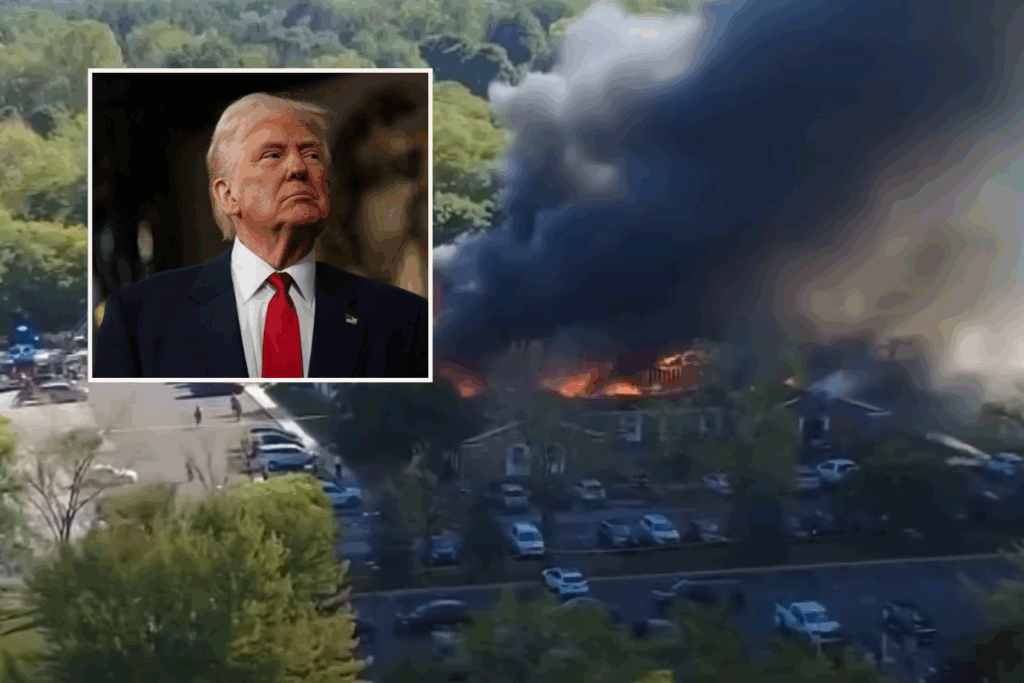There’s an undeniable atmosphere of violence sweeping the US, and the increasingly divisive rhetoric coming from US president Donald Trump and his supporters is fuelling the fire.
Over the weekend, the latest incident saw a gunman open fire inside a Mormon church in Michigan before allegedly setting the building ablaze. The violence killed at least four people, injured several others and has left the country on edge.
While a motive has yet to be identified by officials, Trump has already declared the incident a “targeted attack on Christians”.
It’s a similar political narrative to Trump’s comments following the recent Minneapolis shooting at the Church of the Annunciation, where two children were killed and 18 others injured.
Rather than use the tragedy as a moment to unify people against violence, Trump and his supporters pointed their fingers at leftist ideology and the fact that the shooter was transgender, before any sort of motive for the shooting had been declared by officials.
There’s no doubt that a leader’s rhetoric during a time of national instability holds a defining power in the direction that a country moves forward.
Take, for example, Jacinda Ardern’s response following the Christchurch mosque massacre. It was a defining moment for New Zealand’s national identity when the 40th Prime Minister called for unity, instead of hatred, saying “the person who has perpetuated this violence against us is not [us]”.
Ardern’s approach as a national leader was a rejection of violent rhetoric and a swift ban on almost all semi-automatic weapons in New Zealand.
Compare that to Trump’s words following the shooting in Michigan, as well as the string of recent incidents of violence in the US, and you’ll get a starkly different picture.
Following the assassination of right-wing commentator Charlie Kirk, Trump declared “the problem is on the left, it’s not on the right”, blaming the incident on “radical left political violence”.
Not only is this claim divisive, it’s also not in line with the research that shows that since 2001, right-wing extremist violence has been responsible for the overwhelming majority of fatalities, approximately 75 per cent to 80 per cent of U.S. domestic terrorism deaths.
Looking at gun violence itself, the US Surgeon General issued an advisory in June 2024 that the issue was a public health crisis, and yet, less than a year later, the Trump administration removed this advisory from the Department of Health and Human Services website.
It’s these blatant attempts to control the public discourse around violence that are especially harmful, and unfortunately, is part of the country’s alarming descent into fascism, as many experts warn that national democracy is at risk under Trump’s polarising leadership.
Political leaders hold the power to either unite a nation or divide it, and Trump’s violent rhetoric is clear in its intent for the latter.
And yet, while Trump’s agenda continues down this path, working to demonise the left and ignite national rage, he’s missing one consequential element to the story.
Fire doesn’t care what your political beliefs are. Who you hate or who you love. It will obliterate everyone.
Trump himself was almost a victim of this violence in 2024, when he escaped a near-fatal assassination attempt. Two months after that, another man tried to assassinate Trump again in Florida.
That same year, in December, the head of UnitedHealthcare Brian Thompson was shot and killed by Luigi Mangione. In April 2025, arsonists set fire to Pennsylvania governor, Josh Shapiro’s home, and in June, Democratic politician Melissa Hortman was killed by armed attackers in her own Minnesota home.
Since Trump’s first political campaign in 2015, experts have seen an increase in his repeated references to a nation under siege and speeches filled with words and phrases related to crime. It’s this language that is heightening anxiety among his supporters and making them see him as a sort of saviour or protective figure.
The catch is, however, that a normalisation of this violent rhetoric doesn’t serve anyone.
Whether you’re a Republican, a Democrat, religious or non-religious, the violence in a nation on fire has the potential to reach you, which is both a horrible and ironically unifying fact.


